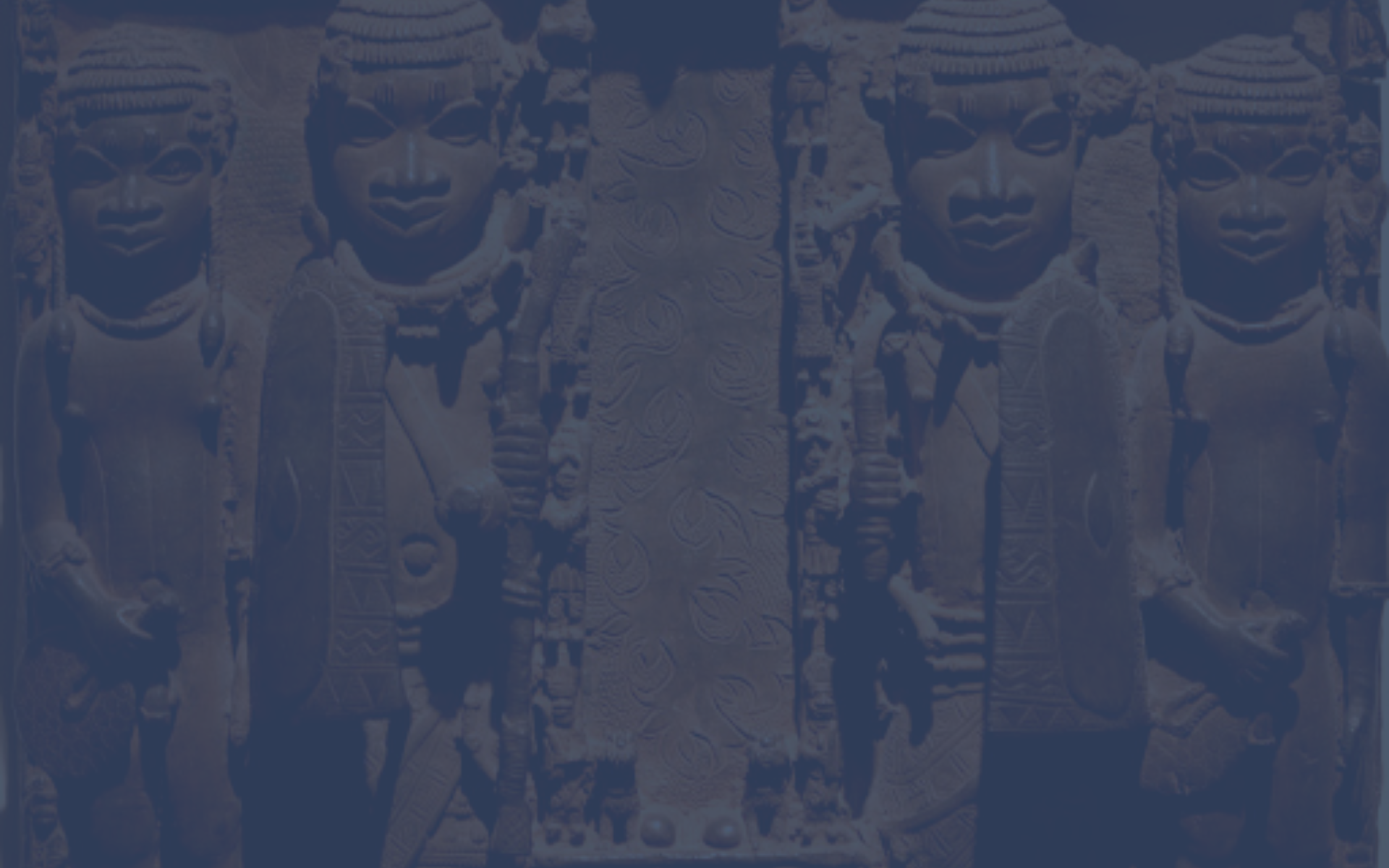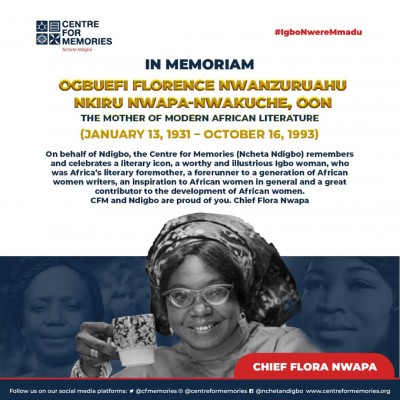
Blog
CELEBRATING THE POSTHUMOUS 90TH BIRTHDAY OF A LITERARY ICON: Ogbuefi Florence Nwanzuruahu Nkiru Nwapa-Nwakuche, OON

CELEBRATING THE POSTHUMOUS 90TH BIRTHDAY OF A LITERARY ICON: Ogbuefi Florence Nwanzuruahu Nkiru Nwapa-Nwakuche, OON
CELEBRATING THE POSTHUMOUS 90TH BIRTHDAY OF A LITERARY ICON; Ogbuefi Florence Nwanzuruahu Nkiru Nwapa-Nwakuche, OON
Mother of Modern African Literature
(January 13, 1931 – October 16, 1993)
For over five decades, there is a name that is always mentioned whenever and wherever there is a discussion on great African women icons. A woman who has remained a role model and great inspiration to many women for many decades, and has continued to be, even three decades after she has passed on. That woman is Flora Nwapa, the author of the popular novel, Efuru.
Florence Nwanzuruahu Nkiru Nwapa-Nwakuche, Nigeria’s first female novelist and the first female novelist in the English Language in all of black Africa to be published internationally, was born on January 13, 1931, in Oguta (or Ugwuta), a city situated on the east of the beautiful Oguta Lake in Imo State, South-East Nigeria. She was the eldest of the six children of Christopher Ijeoma Nwapa.
Unlike most writers of her time, Flora Nwapa did not have the dreams of becoming a writer. Writing was a pastime she only used to ward off boredom. However, that passive hubby metamorphosed into a great calling as she became an author who is now acknowledged as the mother of modern African literature.
Flora attended Ugwuta CMS Central School, Archdeacon Crowther Memorial Girls’ School, Rivers State, CMS Girls’ School, Lagos and the prestigious Queens College, Yaba, Lagos from 1951-1952, then proceeded to the University of Ibadan (then University College, Ibadan) in 1953 where she finished with a bachelor degree in arts (BA) in 1957. She then moved to Scotland where she earned a Diploma in Education from the University of Edinburgh in 1958.
On her return to Nigeria in 1959, she worked as an education officer in Calabar for a short time. She taught Geography and English at Queen’s School in Enugu. From 1962 to 1964 Nwapa was an assistant registrar at the University of Lagos. In 1966, she became acknowledged as the first African woman novelist to be published in the English language in Britain after she published her first novel, Efuru. She had earlier sent the transcript to the legendary Chinua Achebe in 1962, who replied with a very positive letter and even included money for the postage to mail the manuscript to the English publisher, Heinemann.
During the Biafra war, Flora Nwapa and her family were forced to return to the Eastern region. After the war, she served as Minister for Health and Social Welfare for the East Central State (1970-1971). Her tasks included finding homes for 2000 war orphans. She later went on to work as Commissioner for Lands, Survey, and Urban Development (1971-1974).
In 1974, Flora Nwapa founded Tana Press, which published adult fiction. It was the first indigenous publishing house owned by a black African woman in West Africa. She also founded another publishing company in 1977; the Flora Nwapa Company, publishing her adult and children's literature as well as works by other writers. Between 1979 and 1981 she produced eight volumes of adult fiction. In these books, she combined Nigerian elements with general moral and ethical teachings. One of her objectives was "to inform and educate women all over the world, especially feminists about the role of women in Nigeria, their economic independence, their relationship with their husbands and children, their traditional beliefs and their status in the community as a whole". Tana Press has been described as "the first press run by a woman and targeted at a large female audience. A project far beyond its time at a period when no one saw African women as constituting a community of readers or a book-buying demographic”.
Some of Flora Nwapa’s works include;
Novels
Efuru – 1966
Never Again – 1975
One is Enough – 1981
Women are Different – 1986
The Lake Goddess – 1993 (Published Posthumously)
Short Stories/Poems
This is Lagos and Other Stories – 1971
Cassava Song and Rice Song – 1986
Wives at War and Other Stories – 1980
Children’s books
Emeka, Driver’s Guard – 1972
Mammywater – 1979
Journey to Space – 1980
The Miracle Kittens – 1980
The Adventures of Deke – 1980
In 1982, the Nigerian government bestowed on her one of the country’s highest honors, the Officer of the Order of the Niger (OON). She was so towering in intellect and wisdom that her people conferred upon her a title traditionally set aside for men who have greatly distinguished themselves. She was made the Ogbuefi in 1978, not a small achievement in the paternalistic societies of Africa. But with Flora Nwapa, even men doffed their feathered hats and gave her the salutes she truly deserves. She is a woman of substance with so many achievements and ground-breaking records.
During her career as an educator, she taught at various international colleges and universities including New York University, Trinity College, University of Minnesota, University of Michigan, and University of Ilorin. She was a distinguished member of PEN International and the Commonwealth Writer’s Awards committee, and also served as the President of the Association of Nigerian Authors (ANA). In 1989, she was made a Visiting Professor of Creative Writing at the University of Maiduguri and remained so till her death.
Chief Flora Nwapa died on 16th October 1993 at a hospital in Enugu, Nigeria, at the age of 62. Her final novel, The Lake Goddess, was published posthumously. After her death, the late environmentalist, writer, and activist, Kenule “Ken” Saro-Wiwa, in paying tribute to her at the funeral said, “Flora is gone and we all have to say adieu. But she left behind an indelible mark. No one will ever write about Nigerian literature in English without mentioning her. She will always be the departure point for female writing in Africa. And African publishing will forever owe her a debt. But above all, her contribution to the development of women in Nigeria, nay in Africa, and throughout the world is what she will be best remembered for.”
CFM and Ndigbo remember Ogbuefi Flora Nwapa with a sense of pride for her literary prowess, contribution to the literary world, and commitment to the cause of women all over the world.




